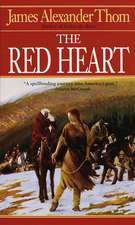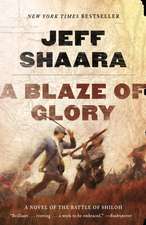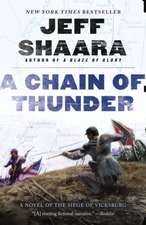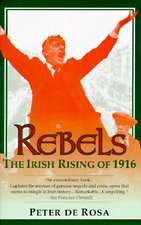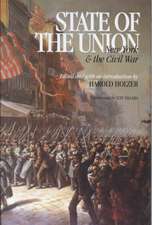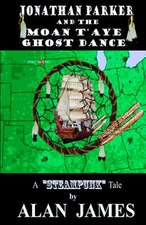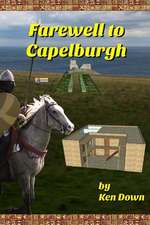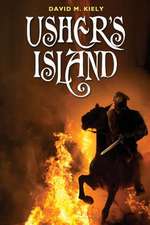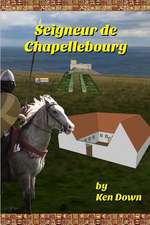The Last Full Measure
Autor Jeff Shaaraen Limba Engleză Paperback – 30 apr 2000
As The Last Full Measure opens, Gettysburg is past and the war advances to its third brutal year. On the Union side, the gulf between the politicians in Washington and the generals in the field yawns ever wider. Never has the cumbersome Union Army so desperately needed a decisive, hard-nosed leader. It is at this critical moment that Lincoln places Ulysses S. Grant in command—and turns the tide of war.
For Robert E. Lee, Gettysburg was an unspeakable disaster—compounded by the shattering loss of the fiery Stonewall Jackson two months before. Lee knows better than anyone that the South cannot survive a war of attrition. But with the total devotion of his generals—Longstreet, Hill, Stuart—and his unswerving faith in God, Lee is determined to fight to the bitter end.
Here too is Joshua Chamberlain, the college professor who emerged as the Union hero of Gettysburg—and who will rise to become one of the greatest figures of the Civil War.
Battle by staggering battle, Shaara dramatizes the escalating confrontation between Lee and Grant—complicated, heroic, deeply troubled men. From the costly Battle of the Wilderness to the agonizing siege of Petersburg to Lee’s epoch-making surrender at Appomattox, Shaara portrays the riveting conclusion of the Civil War through the minds and hearts of the individuals who gave their last full measure.
Full of human passion and the spellbinding truth of history, The Last Full Measure is the fitting capstone to a magnificent literary trilogy.
From the Hardcover edition.
Preț: 60.98 lei
Nou
Puncte Express: 91
Preț estimativ în valută:
11.68€ • 11.98$ • 9.83£
11.68€ • 11.98$ • 9.83£
Carte disponibilă
Livrare economică 05-19 februarie
Preluare comenzi: 021 569.72.76
Specificații
ISBN-13: 9780345434814
ISBN-10: 0345434811
Pagini: 640
Dimensiuni: 108 x 175 x 29 mm
Greutate: 0.3 kg
Editura: BALLANTINE BOOKS
ISBN-10: 0345434811
Pagini: 640
Dimensiuni: 108 x 175 x 29 mm
Greutate: 0.3 kg
Editura: BALLANTINE BOOKS
Notă biografică
Jeff Shaara is the New York Times bestselling author of A Chain of Thunder, A Blaze of Glory, The Final Storm, No Less Than Victory, The Steel Wave, The Rising Tide, To the Last Man, The Glorious Cause, Rise to Rebellion, and Gone for Soldiers, as well as Gods and Generals and The Last Full Measure—two novels that complete the Civil War trilogy that began with his father’s Pulitzer Prizeߝwinning classic, The Killer Angels. Shaara was born into a family of Italian immigrants in New Brunswick, New Jersey. He grew up in Tallahassee, Florida, and graduated from Florida State University. He lives again in Tallahassee.
Recenzii
"Riveting . . . Vivid . . . Brilliantly depicted. . . . THE LAST FULL MEASURE IS MORE THAN ANOTHER HISTORICAL NOVEL. It is rooted in history, but its strength is the element of humanity flowing through its characters. . . . The book is compelling, easy to read, well researched and written, and thought-provoking. . . . In short, it is everything that a reader could ask for."
--Chicago Tribune
"A WORTHY COMPANION TO ITS TWO PREDECESSORS . . . These characters come alive as complex, heroic, and flawed men. . . . You are with [Robert E.] Lee, a deeply religious man, as he first begins to wonder if the Confederate cause will prevail. . . . You ride with [Ulysses S.] Grant to see the mounds of Union dead at Cold Harbor, and you share his sickening realization that thousands are dead because of his miscalculation. . . . You are at [Joshua] Chamberlain's bedside as he fights to recover from nearly mortal wounds. . . . Each book is masterful in its own way and taken together, they are unmatched in the body of Civil War literature."
--The Baltimore Sun
"AN AMBITIOUS WORK . . . [Shaara] writes with considerable sensitivity and skill, setting vivid scenes and adding drama and suspense to a familiar tale."
--The Seattle Times
"Exhaustively researched, infused with a profound understanding of the great issues of a nation and the small quirks of the human heart and ego, The Last Full Measure is fiction that brings history brilliantly to life."
--Newsday
--Chicago Tribune
"A WORTHY COMPANION TO ITS TWO PREDECESSORS . . . These characters come alive as complex, heroic, and flawed men. . . . You are with [Robert E.] Lee, a deeply religious man, as he first begins to wonder if the Confederate cause will prevail. . . . You ride with [Ulysses S.] Grant to see the mounds of Union dead at Cold Harbor, and you share his sickening realization that thousands are dead because of his miscalculation. . . . You are at [Joshua] Chamberlain's bedside as he fights to recover from nearly mortal wounds. . . . Each book is masterful in its own way and taken together, they are unmatched in the body of Civil War literature."
--The Baltimore Sun
"AN AMBITIOUS WORK . . . [Shaara] writes with considerable sensitivity and skill, setting vivid scenes and adding drama and suspense to a familiar tale."
--The Seattle Times
"Exhaustively researched, infused with a profound understanding of the great issues of a nation and the small quirks of the human heart and ego, The Last Full Measure is fiction that brings history brilliantly to life."
--Newsday
Extras
By July 1863 the Civil War has been fought over the farmlands and seacoasts of the South for better than two years, and is already one of the bloodiest wars in human history. It is a war that most believed would be decided by one quick fight, one great show of strength by the power of the North. The first major battle, called Bull Run in the North, Manassas in the South, is witnessed by a carefree audience of Washington's elite. Their brightly decorated carriages carry men in fine suits and society matrons in colorful dresses. They perch on a hillside, enjoying their picnics, anticipating a great show with bands playing merrily while the young men in blue march in glorious parade and sweep aside the ragged band of rebels. What they see is the first great horror, the stunning reality that this is in fact a war, and that men will die. What they still cannot understand is how far this will go, and how many men will die.
In the North, President Lincoln maintains a fragile grip on forces pulling the government in all directions. On one extreme is the pacifist movement, those who believe that the South has made its point, and so, to avoid bloodshed, Washington must simply let them go, that nothing so inconsequential as the Constitution is as important as the loss of life. On the other extreme are the radical abolitionists, who demand the South be brought down entirely, punished for its way of life, its culture, and that anyone who supports the southern cause should be purged from the land. There is also a great middle ground, men of reason and intellect, who now understand that there is more to this war than the inflammatory issue of slavery, or the argument over the sovereign rights of the individual states. As men continue to volunteer, larger and larger numbers of troops take to the fields, and other causes emerge, each man fighting for his own reason. Some fight for honor and duty, some for money and glory, but nearly all are driven by an amazing courage, and will carry their muskets across the deadly space because they feel it is the right thing to do.
From the North come farmers and fishermen, lumberjacks and shopkeepers, old veterans and young idealists. Some are barely Americans at all, expatriates and immigrants from Europe, led by officers who do not speak English. Some are freedmen, Negroes who volunteer to fight for the preservation of the limited freedoms they have been given, and to spread that freedom into the South.
In the South they are also farmers and fishermen, as well as ranchers, laborers, aristocrats, and young men seeking adventure. They are inspired first by the political rhetoric, the fire-breathing oratory of the radical secessionists. They are told that Lincoln is in league with the devil, and that his election ensures that the South will be held down, oppressed by the powerful interests in the North, that their very way of life is under siege. When the sound of the big guns echo across Charleston harbor, when the first flashes of smoke and fire swallow Fort Sumter, Lincoln orders an army to go south, to put down the rebellion by force. With the invasion comes a new inspiration, and in the South, even men of reason are drawn into the fight, men who were not seduced by mindless rhetoric, who have shunned the self-serving motives of the politicians. There is outrage, and no matter the issues or the politics, many take up arms in response to what they see as the threat to their homes. Even the men who understand and promote the inevitable failure of slavery cannot stand by while their land is invaded. The issue is not to be decided after all by talk or rhetoric, but by the gun.
On both sides are the career soldiers, West Pointers, men with experience from the Mexican War, or the Indian wars of the 1850s. In the North the officers are infected and abused by the disease of politics, and promotion is not always granted by performance or ability. The Federal armies endure a parade of inept or unlucky commanders who cannot fight the rebels until they first master the fight with Washington. Few succeed.
In the South, Jefferson Davis maintains an iron hand, controlling even the smallest details of governing the Confederacy. It is not an effective system, and as in the North, men of political influence are awarded positions of great authority, men who have no business leading soldiers into combat. In mid-1862, through an act of fate, or as he would interpret it, an act of God, Robert Edward Lee is given command of the Army of Northern Virginia. What follows in the East is a clear pattern, a series of great and bloody fights in which the South prevails and the North is beaten back. If the pattern continues, the war will end and the Confederacy will triumph. Many of the fights are won by Lee, or by his generals--the Shenandoah Valley, Second Manassas. Many of the fights are simply lost by the blunders of Federal commanders, the most horrifying example at Fredericksburg. Most, like the catastrophic Federal defeat at Chancellorsville or the tactical stalemate at Antietam, are a combination of both.
By 1863 two monumental events provide an insight into what lies ahead. The first is the success of the Federal blockade of southern seaports, which prevents the South from receiving critical supplies from allies abroad, and also prevents the export of raw materials, notably cotton and tobacco, which provide the currency necessary to pay for the war effort. The result is understood on both sides. Without outside help, the Confederacy will slowly starve.
The second is the great bloody fight at Gettysburg. While a tragic defeat for Lee's army, there is a greater significance to the way that defeat occurs. Until now, the war has been fought mostly from the old traditions, the Napoleonic method, the massed frontal assault against fortified positions. It has been apparent from the beginning of the war that the new weaponry has made such attacks dangerous and costly, but old ways die slowly, and commanders on both sides have been reluctant to change. After Gettysburg, the changes become a matter of survival. If the commanders do not yet understand, the men in the field do, and the use of the shovels becomes as important as the use of muskets. The new methods--strong fortifications, trench warfare--are clear signs to all that the war has changed, that there will be no quick and decisive fight to end all fights.
As the Civil War enters its third year, the bloody reports continue to fill the newspapers, and the bodies of young men continue to fill the cemeteries. To the eager patriots, the idealists and adventurers who joined the fight at the beginning, there is a new reality, in which honor and glory are becoming hollow words. The great causes are slowly pushed aside, and men now fight with the grim determination to take this fight to its end; after so much destruction and horrible loss, the senses are dulled, the unspeakable sights no longer shock. All the energy is forward, toward those men across that deadly space who have simply become the enemy.
--------------------------------------------------------------------------------
Robert Edward Lee
Born in 1807, he graduates West Point in 1829, second in his class. Though he is the son of "Light-Horse" Harry Lee, a great hero of the American Revolution, late in his father's life Lee must endure the burden of his father's business and personal failures more than the aura of heroism. Lee is devoutly religious, believing with absolute clarity that the events of his life are determined by the will of God. On his return from West Point, his mother dies in his arms. The haunting sadness of her death stays hard inside him for the rest of his life, and places him more firmly than ever into the hands of his God.
He marries the aristocratic Mary Anne Randolph Custis, whose father is the grandson of Martha Washington, and whose home is the grand mansion of Arlington, overlooking the Potomac River. The Lees have seven children, and Lee suffers the guilt of a career that rarely brings him home to watch his children grow, a source of great regret for him, and simmering bitterness in his wife Mary.
Lee is a brilliant engineer, and his army career moves him to a variety of posts where his expertise and skill contribute much to the construction of the military installations and forts along the Atlantic coast. He goes to St. Louis and confronts a crisis for the port there by rerouting the flow of the Mississippi River. In 1846 he is sent to Mexico,and his reputation lands him on the staff of General-in-Chief Winfield Scott. Lee performs with efficiency and heroism, both as an engineer, a scout, and a staff officer, and leaves Mexico a lieutenant colonel.
He accepts command of the cadet corps at West Point in 1851, considered by many as the great reward for good service, the respectable job in which to spend the autumn of his career. But though his family is now close, he misses the action of Mexico, finds himself stifled by administrative duties. In 1855 he stuns all who know him by seizing an opportunity to return to the field, volunteering to go to Texas, to command a new regiment of cavalry. But even that command is mundane and frustrating, and there is for him nothing in the duty that recalls the vitality and adventure of the fighting in Mexico. Throughout the 1850s Lee settles into a deep gloom, resigns himself that no duty will be as fulfilling as life under fire and that his career will carry him into old age in bored obscurity.
As the conflict over Lincoln's election boils over in the South, his command in Texas begins to collapse, and he is recalled to Washington in early 1861, where he receives the startling request to command Lincoln's new volunteer army, with a promotion to Major General. He shocks Washington and deeply disappoints Winfield Scott by declining the appointment. Lee chooses the only course left to an officer and a man of honor and resigns from his thirty-year career. He believes that even though Virginia has not yet joined the secessionist states, by organizing an army to invade the South, Lincoln has united his opponents and the southern states, which must eventually include Virginia. Lee will not take up arms against his home.
In late April 1861 he accepts the governor's invitation to command the Virginia Militia, a defensive force assembled to defend the state. When Jefferson Davis moves the Confederate government to Richmond, the Virginia forces, as well as those of the other ten secessionist states, are absorbed into the Confederate army. Lee is invited to serve as military consultant to Davis, another stifling job with little actual authority. In July 1861, during the first great battle of the war, Lee sits alone in his office, while most of official Richmond travels to Manassas, to the excitement of the front lines.
In June 1862, while accompanied by Davis near the fighting on the Virginia peninsula, commander Joe Johnston is wounded in action and Davis offers command of the Army of Northern Virginia to Lee. Lee accepts, understands that he is, after all, a soldier, and justifies the decision with the fact that his theater of war is still Virginia. Defending his home takes on a more poignant significance when Lee's grand estate at Arlington is occupied and ransacked by Federal troops.
Lee reorganizes the army, removes many of the inept political generals, and begins to understand the enormous value of his two best commanders, James Longstreet and Thomas Jackson, who at Manassas was given the nickname "Stonewall." Using the greatest talents of both men, Lee leads the Army of Northern Virginia through a series of momentous victories against a Federal army that is weighed down by its own failures, and by its continuing struggle to find an effective commander. Much of Lee's war is fought in northern Virginia, and the land is suffering under the strain of feeding the army. The burden of war and of the Federal blockade spreads through the entire Confederacy and inspires Lee and Davis to consider a bold and decisive strategy.
In September 1862, Lee moves his army north, hoping to gather support and new recruits from the neutral state of Maryland. The advance results in the battle of Sharpsburg--known as Antietam in the North--and though Lee does not admit defeat, the outrageous carnage and loss of life force him to order a retreat back into Virginia. But his army is not pursued by the Federal forces, and with new commanders now confronting him, Lee begins a great tactical chess game, and accomplishes the greatest victories of the war.
In December 1862, at Fredericksburg, Virginia, his army maintains the defensive and completely crushes poorly planned Federal assaults. In May 1863, at Chancellorsville, Lee is outnumbered nearly three to one, and only by the utter audacity of Stonewall Jackson does the huge Federal army retire from the field with great loss. But the battle is costly for Lee as well. Jackson is accidentally shot by his own men, and dies after a weeklong struggle with pneumonia.
Lee and Davis continue to believe that a move northward is essential, that with weakened confidence and inept commanders, the Federal army need only be pushed into one great battle that will likely end the war. In June 1863, Lee's army marches into Pennsylvania. He believes that a great fight might not even be necessary, that just the threat of spilling blood on northern soil will put great pressure on Washington, and the war might be brought to an end by the voice of the northern people. The invasion of the North will serve another purpose: to take the fight into fertile farmlands where Lee might feed his increasingly desperate army.
Some in Lee's army question the strategy, raising the moral question of how to justify an invasion versus defending their homes. Others question the military judgment of moving into unfamiliar territory, against an enemy that has never been inspired by fighting on its own ground. There are other factors that Lee must confront. Though he is personally devastated by the death of Jackson, Jackson's loss means more to his army than Lee fully understands.
As the invasion moves north, Lee is left blind by his cavalry, under the flamboyant command of Jeb Stuart. Stuart fails to provide Lee with critical information about the enemy and is cut off from Lee beyond the march of the Federal army, an army that is moving to confront Lee with uncharacteristic speed. The Federal Army of the Potomac has yet another new commander, George Gordon Meade, and if Lee knows Meade to be a careful man, cautious in his new command, he also knows that there are many other Federal officers now rising to the top, men who are not political pawns but in fact hard and effective fighters.
In the North, President Lincoln maintains a fragile grip on forces pulling the government in all directions. On one extreme is the pacifist movement, those who believe that the South has made its point, and so, to avoid bloodshed, Washington must simply let them go, that nothing so inconsequential as the Constitution is as important as the loss of life. On the other extreme are the radical abolitionists, who demand the South be brought down entirely, punished for its way of life, its culture, and that anyone who supports the southern cause should be purged from the land. There is also a great middle ground, men of reason and intellect, who now understand that there is more to this war than the inflammatory issue of slavery, or the argument over the sovereign rights of the individual states. As men continue to volunteer, larger and larger numbers of troops take to the fields, and other causes emerge, each man fighting for his own reason. Some fight for honor and duty, some for money and glory, but nearly all are driven by an amazing courage, and will carry their muskets across the deadly space because they feel it is the right thing to do.
From the North come farmers and fishermen, lumberjacks and shopkeepers, old veterans and young idealists. Some are barely Americans at all, expatriates and immigrants from Europe, led by officers who do not speak English. Some are freedmen, Negroes who volunteer to fight for the preservation of the limited freedoms they have been given, and to spread that freedom into the South.
In the South they are also farmers and fishermen, as well as ranchers, laborers, aristocrats, and young men seeking adventure. They are inspired first by the political rhetoric, the fire-breathing oratory of the radical secessionists. They are told that Lincoln is in league with the devil, and that his election ensures that the South will be held down, oppressed by the powerful interests in the North, that their very way of life is under siege. When the sound of the big guns echo across Charleston harbor, when the first flashes of smoke and fire swallow Fort Sumter, Lincoln orders an army to go south, to put down the rebellion by force. With the invasion comes a new inspiration, and in the South, even men of reason are drawn into the fight, men who were not seduced by mindless rhetoric, who have shunned the self-serving motives of the politicians. There is outrage, and no matter the issues or the politics, many take up arms in response to what they see as the threat to their homes. Even the men who understand and promote the inevitable failure of slavery cannot stand by while their land is invaded. The issue is not to be decided after all by talk or rhetoric, but by the gun.
On both sides are the career soldiers, West Pointers, men with experience from the Mexican War, or the Indian wars of the 1850s. In the North the officers are infected and abused by the disease of politics, and promotion is not always granted by performance or ability. The Federal armies endure a parade of inept or unlucky commanders who cannot fight the rebels until they first master the fight with Washington. Few succeed.
In the South, Jefferson Davis maintains an iron hand, controlling even the smallest details of governing the Confederacy. It is not an effective system, and as in the North, men of political influence are awarded positions of great authority, men who have no business leading soldiers into combat. In mid-1862, through an act of fate, or as he would interpret it, an act of God, Robert Edward Lee is given command of the Army of Northern Virginia. What follows in the East is a clear pattern, a series of great and bloody fights in which the South prevails and the North is beaten back. If the pattern continues, the war will end and the Confederacy will triumph. Many of the fights are won by Lee, or by his generals--the Shenandoah Valley, Second Manassas. Many of the fights are simply lost by the blunders of Federal commanders, the most horrifying example at Fredericksburg. Most, like the catastrophic Federal defeat at Chancellorsville or the tactical stalemate at Antietam, are a combination of both.
By 1863 two monumental events provide an insight into what lies ahead. The first is the success of the Federal blockade of southern seaports, which prevents the South from receiving critical supplies from allies abroad, and also prevents the export of raw materials, notably cotton and tobacco, which provide the currency necessary to pay for the war effort. The result is understood on both sides. Without outside help, the Confederacy will slowly starve.
The second is the great bloody fight at Gettysburg. While a tragic defeat for Lee's army, there is a greater significance to the way that defeat occurs. Until now, the war has been fought mostly from the old traditions, the Napoleonic method, the massed frontal assault against fortified positions. It has been apparent from the beginning of the war that the new weaponry has made such attacks dangerous and costly, but old ways die slowly, and commanders on both sides have been reluctant to change. After Gettysburg, the changes become a matter of survival. If the commanders do not yet understand, the men in the field do, and the use of the shovels becomes as important as the use of muskets. The new methods--strong fortifications, trench warfare--are clear signs to all that the war has changed, that there will be no quick and decisive fight to end all fights.
As the Civil War enters its third year, the bloody reports continue to fill the newspapers, and the bodies of young men continue to fill the cemeteries. To the eager patriots, the idealists and adventurers who joined the fight at the beginning, there is a new reality, in which honor and glory are becoming hollow words. The great causes are slowly pushed aside, and men now fight with the grim determination to take this fight to its end; after so much destruction and horrible loss, the senses are dulled, the unspeakable sights no longer shock. All the energy is forward, toward those men across that deadly space who have simply become the enemy.
--------------------------------------------------------------------------------
Robert Edward Lee
Born in 1807, he graduates West Point in 1829, second in his class. Though he is the son of "Light-Horse" Harry Lee, a great hero of the American Revolution, late in his father's life Lee must endure the burden of his father's business and personal failures more than the aura of heroism. Lee is devoutly religious, believing with absolute clarity that the events of his life are determined by the will of God. On his return from West Point, his mother dies in his arms. The haunting sadness of her death stays hard inside him for the rest of his life, and places him more firmly than ever into the hands of his God.
He marries the aristocratic Mary Anne Randolph Custis, whose father is the grandson of Martha Washington, and whose home is the grand mansion of Arlington, overlooking the Potomac River. The Lees have seven children, and Lee suffers the guilt of a career that rarely brings him home to watch his children grow, a source of great regret for him, and simmering bitterness in his wife Mary.
Lee is a brilliant engineer, and his army career moves him to a variety of posts where his expertise and skill contribute much to the construction of the military installations and forts along the Atlantic coast. He goes to St. Louis and confronts a crisis for the port there by rerouting the flow of the Mississippi River. In 1846 he is sent to Mexico,and his reputation lands him on the staff of General-in-Chief Winfield Scott. Lee performs with efficiency and heroism, both as an engineer, a scout, and a staff officer, and leaves Mexico a lieutenant colonel.
He accepts command of the cadet corps at West Point in 1851, considered by many as the great reward for good service, the respectable job in which to spend the autumn of his career. But though his family is now close, he misses the action of Mexico, finds himself stifled by administrative duties. In 1855 he stuns all who know him by seizing an opportunity to return to the field, volunteering to go to Texas, to command a new regiment of cavalry. But even that command is mundane and frustrating, and there is for him nothing in the duty that recalls the vitality and adventure of the fighting in Mexico. Throughout the 1850s Lee settles into a deep gloom, resigns himself that no duty will be as fulfilling as life under fire and that his career will carry him into old age in bored obscurity.
As the conflict over Lincoln's election boils over in the South, his command in Texas begins to collapse, and he is recalled to Washington in early 1861, where he receives the startling request to command Lincoln's new volunteer army, with a promotion to Major General. He shocks Washington and deeply disappoints Winfield Scott by declining the appointment. Lee chooses the only course left to an officer and a man of honor and resigns from his thirty-year career. He believes that even though Virginia has not yet joined the secessionist states, by organizing an army to invade the South, Lincoln has united his opponents and the southern states, which must eventually include Virginia. Lee will not take up arms against his home.
In late April 1861 he accepts the governor's invitation to command the Virginia Militia, a defensive force assembled to defend the state. When Jefferson Davis moves the Confederate government to Richmond, the Virginia forces, as well as those of the other ten secessionist states, are absorbed into the Confederate army. Lee is invited to serve as military consultant to Davis, another stifling job with little actual authority. In July 1861, during the first great battle of the war, Lee sits alone in his office, while most of official Richmond travels to Manassas, to the excitement of the front lines.
In June 1862, while accompanied by Davis near the fighting on the Virginia peninsula, commander Joe Johnston is wounded in action and Davis offers command of the Army of Northern Virginia to Lee. Lee accepts, understands that he is, after all, a soldier, and justifies the decision with the fact that his theater of war is still Virginia. Defending his home takes on a more poignant significance when Lee's grand estate at Arlington is occupied and ransacked by Federal troops.
Lee reorganizes the army, removes many of the inept political generals, and begins to understand the enormous value of his two best commanders, James Longstreet and Thomas Jackson, who at Manassas was given the nickname "Stonewall." Using the greatest talents of both men, Lee leads the Army of Northern Virginia through a series of momentous victories against a Federal army that is weighed down by its own failures, and by its continuing struggle to find an effective commander. Much of Lee's war is fought in northern Virginia, and the land is suffering under the strain of feeding the army. The burden of war and of the Federal blockade spreads through the entire Confederacy and inspires Lee and Davis to consider a bold and decisive strategy.
In September 1862, Lee moves his army north, hoping to gather support and new recruits from the neutral state of Maryland. The advance results in the battle of Sharpsburg--known as Antietam in the North--and though Lee does not admit defeat, the outrageous carnage and loss of life force him to order a retreat back into Virginia. But his army is not pursued by the Federal forces, and with new commanders now confronting him, Lee begins a great tactical chess game, and accomplishes the greatest victories of the war.
In December 1862, at Fredericksburg, Virginia, his army maintains the defensive and completely crushes poorly planned Federal assaults. In May 1863, at Chancellorsville, Lee is outnumbered nearly three to one, and only by the utter audacity of Stonewall Jackson does the huge Federal army retire from the field with great loss. But the battle is costly for Lee as well. Jackson is accidentally shot by his own men, and dies after a weeklong struggle with pneumonia.
Lee and Davis continue to believe that a move northward is essential, that with weakened confidence and inept commanders, the Federal army need only be pushed into one great battle that will likely end the war. In June 1863, Lee's army marches into Pennsylvania. He believes that a great fight might not even be necessary, that just the threat of spilling blood on northern soil will put great pressure on Washington, and the war might be brought to an end by the voice of the northern people. The invasion of the North will serve another purpose: to take the fight into fertile farmlands where Lee might feed his increasingly desperate army.
Some in Lee's army question the strategy, raising the moral question of how to justify an invasion versus defending their homes. Others question the military judgment of moving into unfamiliar territory, against an enemy that has never been inspired by fighting on its own ground. There are other factors that Lee must confront. Though he is personally devastated by the death of Jackson, Jackson's loss means more to his army than Lee fully understands.
As the invasion moves north, Lee is left blind by his cavalry, under the flamboyant command of Jeb Stuart. Stuart fails to provide Lee with critical information about the enemy and is cut off from Lee beyond the march of the Federal army, an army that is moving to confront Lee with uncharacteristic speed. The Federal Army of the Potomac has yet another new commander, George Gordon Meade, and if Lee knows Meade to be a careful man, cautious in his new command, he also knows that there are many other Federal officers now rising to the top, men who are not political pawns but in fact hard and effective fighters.
Descriere
This rousing sequel to "The Killer Angels" and "Gods and Generals" brings the legendary father-son trilogy to its stunning conclusion with a thought-provoking account of the last two years of the Civil War. The "Chicago Tribune" has called this novel riveting, vivid and brilliantly depicted.

